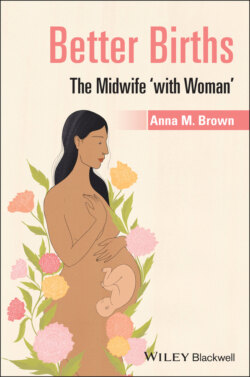Читать книгу Better Births - Anna Brown - Страница 37
A Woman's Story Emily's Story
ОглавлениеI see birth as a huge part of my life experience, something that is completely transformative, in every aspect of life. When I became pregnant with my first child, I actively sought out and became informed about how I was more likely to achieve a positive experience. This led to the knowledge that having a known care provider throughout my experience is more likely to lead to positive feelings, even if things don't go as expected. My babies were all born at home, I saw making this decision as me being in control and more likely to have the experience I wanted. However, I did have the constant worry that a midwife would not be available to attend my births due to shortages.
I was fortunate to see the same midwife for my first and second pregnancies. In fact, I swapped my maternity care to a different GP practice (we had moved to a new house) to see the midwife I ‘clicked’ the most with. However, it turns out I didn't receive any midwifery support during my first and second births. The first was because I didn't realise I was in active labour and so we did not call in time (I birth quickly!); the second, despite phoning in time, there wasn't enough staff to send out to me due to other home births happening in the area.
I decided to stay at home when this was stated as I instinctively knew my son would be born soon and I really didn't want to birth at the roadside! His birth was straightforward as expected and paramedics were on standby but did not interfere (as there was no need), but I felt like I had to fight with the midwives over the phone and justify my decisions, something that I really did not want to deal with during labour, nor should have to. I had made an informed decision, which was not taken lightly. For me, the risks of transferring outweighed staying at home at this point. I felt a huge pressure to comply even though what the midwives were suggesting was not the safest option for me and my baby at that time. I feel like because we were unknown to the hospital staff on the phone, they did not understand my decision making or know anything about us. Perhaps if it had been a known midwife we would have been able to work together easier as the relationship would have already been established.
This experience unfortunately led to an unnecessary backlash in the immediate few weeks with my baby, a time where we should have been resting and bonding following what should have been a positive straightforward labour at home. I felt very low even though the hospital immediately apologised. I had an overwhelming urge to prevent this from happening to another woman, I wanted to understand why women's basic human rights in labour were not respected or understood. I had several meetings to address this, but it led to me feeling a complete mistrust in the system as they really weren't ‘with woman’ when I needed them to be; it felt like they were ‘against woman unless you comply’, so when I became pregnant with my third child, I actively sought out continuity of care elsewhere.
I did my research and I was fortunate at this moment in our lives to budget for an independent midwife. Myself and my husband are not well‐off people, but with some savings and inheritance money we were able to prioritise the care that I needed emotionally during this time. This was to be our last baby and her entrance to the world mattered for her, but also for me as a parent. I needed to emotionally heal after the experience around my second birth. I needed the time to build up a relationship with my midwife and I needed to trust them completely. I can honestly say this was money well spent!
My independent midwife, Rachel, came to my home for mutually convenient appointments. My husband and children got to know her; she was there for us as a family. I felt able to contact her whenever I wanted/needed, and she would provide me with sound evidence and support. I felt my choices and decisions were respected, heard and unjudged. But I think the most important thing was that I felt comfortable and at ease emotionally! This was somebody that was going to be attending my birth, which is so intimate, so this was important to me. Also, having that reassurance throughout my pregnancy that she was more likely to be able to attend my birth was worth paying for! Rachel provided six weeks postpartum care and I knew that if I needed to speak to/see her in between visits I could.
For me, continuity of care brings back midwives to be more ‘with woman’. I am aware there are NHS pilot schemes in our area to bring back this model; I'm sure this will bring many benefits to the women it will support. I hope that in turn the system can be more ‘with midwife’ to support them to be ‘with woman’.
